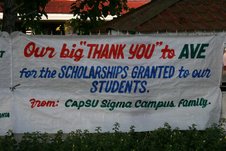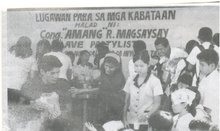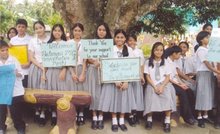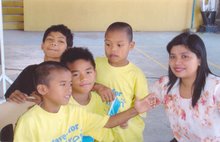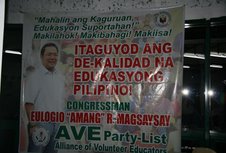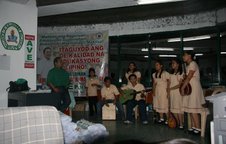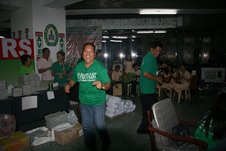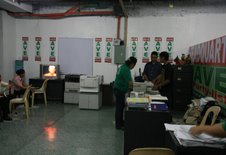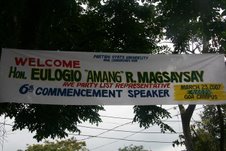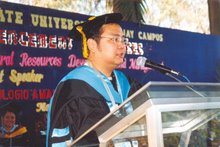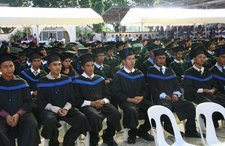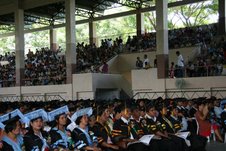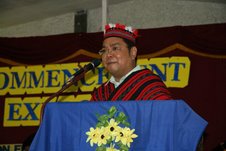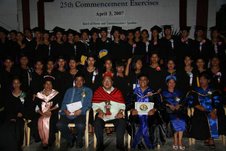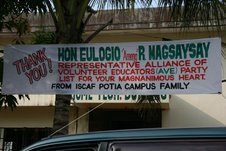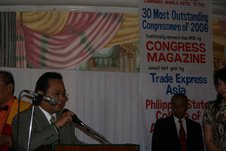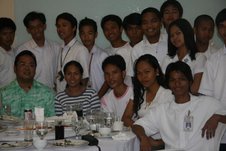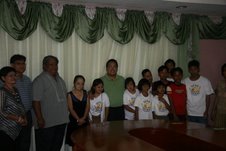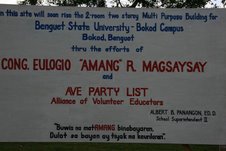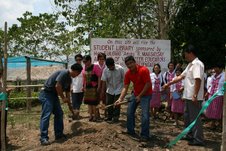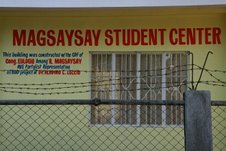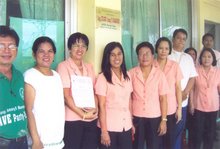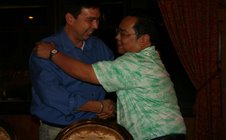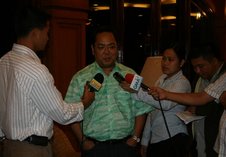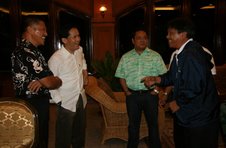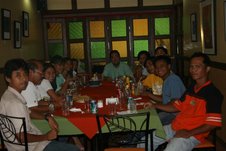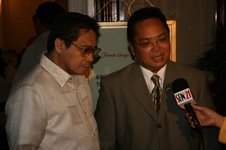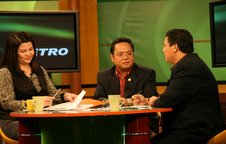National Career Assessment Examination (NCAE), Gawing Gabay sa Kolehiyo
Sa susunod na linggo, sasailalim sa kauna-unahang National Career Assessment Examination (NCAE) ang may 1.8 milyong fourth year high school student ng humigit-kumulang na 13,000 pampubliko at pribadong paaralan sa buong bansa.
Matatandaang ang NCAE ay isinusulong ng Kagawaran ng Edukasyon (DepEd) sa pamamagitan ng National Education Testing and Research Center (NETRC) kapalit ng National College Entrance Examination (NCEE). Layunin nitong gabayan ang mga mag-aaral natin na magsisipagtapos na malaman ang kursong naaangkop sa kanilang talino at kakayahan. Sa ganitong paraan, maiibsan natin ang suliranin na kinakaharap ng ating bansa hinggil sa di pagkakatugma ng gradweyt at ng trabahong nangangailangan ng taong gaganap sa hinihinging serbisyo. Ang resulta ng eksaminasyon ang magsisilbing pamantayan ng mag-aaral hinggil sa kursong maaari niyang pagtagumpayan.
Isa rin itong paraan ng mga kinauukulan na mas lalong isulong ang mga technical-vocational courses sa bansa. Di tulad ng NCEE na limitado lamang sa kakayahang pang-akademiko ang sinusukat, ang NCAE ay titingnan rin ang teknikal at bokasyunal at entreprenuryal na kakayahan ng mga magsisipagtapos. Bukod dito, ang naturang pagsusulit ay binubuo ng Scientific Ability, Mathematical Ability, Reading Comprehension, Verbal Ability, Manipulative Skills, Clerical Ability, at Non-Verbal Ability.
Ang magiging resulta ng pagsusulit sa unang taon nito ay gagawin lamang basehan sa pagpapatnubay ng mga kinauukulan sa anumang kursong nais kunin ng mga magsisipag-kolehiyo. Inaasahang sa taong 2009, ang resulta ng NCAE ay magiging batayan sa pagkuha ng anumang baccalaureate o voc-tech courses. Upang maisakatuparan ito, kinakailangan magpasa ng isang batas. Magiging basehan din ito ng pagpili ng mga out-of-school youths (OSY) na nais kumuha ng scholarship grant sa ilalim ng Commission on Higher Education (CHED).
Para sa Alliance of Volunteer Educators (AVE) Party-list sa pangunguna ni Cong. Eulogio “Amang” R. Magsaysay, walang masama kung magkakaroon ng eksaminasyong tulad nito hangga’t ang layunin nito ay mapabuti ang kaledad ng edukasyon at maging gabay ito ng mga mag-aaral sa pagpili ng kurso. Subalit para kay Cong. Magsaysay, bilang career assessment examination, nararapat lamang na maging paraan ito upang mabigyan ang mga magsisipagtapos ng senaryo kung saan sila magaling o saan sila pwede magkaroon ng magandang propesyon. Hindi dapat maging requirement ang magiging resulta ng eksaminasyon para ipilit ang anumang kurso sa bata.
Naniniwala ang AVE party-list na hindi dapat maging mandatory o obligasyon ang pagkuha ng mataas na resulta ng eksamin sa aspetong patungkol sa kursong nais kunin ng isang mag-aaral. Gamitin lamang ang NCAE upang mabigyan ang mga mag-kokolehiyo ng mga pagpipilian na kursong pwede nilang kunin. Ngunit sa huli, nasa indibidwal pa rin ang desisyon kung nais niyang kumuha ng apat na taong kurso o voc-tech na kurso.
Kung gagawin kasi nating mandatory o pre-requisite ang resulta ng NCAE, mawawalan na ng kalayaan ang mga mag-aaral na malayang pumili ng kanilang nais tahakin na landas. Kung nais nilang kumuha ng nursing course kahit ang resulta ng eksaminasyon ay mas maigi ang voc-tech na kurso sa kanila. Hindi naman ibig sabihin nito ay nagiging pabaya ang pamahalaan sa tungkulin nitong magkaroon ng de-kelidad na edukasyon. Ang mahalaga, nabigyan ng pagkakataon ang mga magsisipagtapos na ma-assess nila ang kanilang sariling talino at kakayahan. Alam na nila ngayon ang kanilang kahinaan, kalakasan at potensyal. Mayroon na silang malawak na pag-iisip sa pagpili ng anumang kursong kanilang kukunin at anumang daan ang kanilang tatahakin.
Ang pagsasaalang-alang sa edukasyon ay tunay ngang napakahalaga. Batid nating patuloy na nagkakaroon ng “mismatch” at underemployment sa ating mga manggagawa. Kung hindi natin isasaayos ang suliranin sa sistema ng ating edukasyon, patuloy tayong mapag-iiwanan ng ating mga katabing bansa at patuloy tayong mangangapa sa aspeto ng ekonomiya. Subalit, isaisip rin natin na ang kalayaan ng mga mag-aaral na pumili ng kanilang kurso ay hindi dapat iisantabi. Oo atin silang gabayan, subalit huwag natin silang pilitin kung sa tingin nila’y mas malaki ang kinabukasan nila sa kursong kanilang kukunin at propesyong tatahakin.
Matatandaang ang NCAE ay isinusulong ng Kagawaran ng Edukasyon (DepEd) sa pamamagitan ng National Education Testing and Research Center (NETRC) kapalit ng National College Entrance Examination (NCEE). Layunin nitong gabayan ang mga mag-aaral natin na magsisipagtapos na malaman ang kursong naaangkop sa kanilang talino at kakayahan. Sa ganitong paraan, maiibsan natin ang suliranin na kinakaharap ng ating bansa hinggil sa di pagkakatugma ng gradweyt at ng trabahong nangangailangan ng taong gaganap sa hinihinging serbisyo. Ang resulta ng eksaminasyon ang magsisilbing pamantayan ng mag-aaral hinggil sa kursong maaari niyang pagtagumpayan.
Isa rin itong paraan ng mga kinauukulan na mas lalong isulong ang mga technical-vocational courses sa bansa. Di tulad ng NCEE na limitado lamang sa kakayahang pang-akademiko ang sinusukat, ang NCAE ay titingnan rin ang teknikal at bokasyunal at entreprenuryal na kakayahan ng mga magsisipagtapos. Bukod dito, ang naturang pagsusulit ay binubuo ng Scientific Ability, Mathematical Ability, Reading Comprehension, Verbal Ability, Manipulative Skills, Clerical Ability, at Non-Verbal Ability.
Ang magiging resulta ng pagsusulit sa unang taon nito ay gagawin lamang basehan sa pagpapatnubay ng mga kinauukulan sa anumang kursong nais kunin ng mga magsisipag-kolehiyo. Inaasahang sa taong 2009, ang resulta ng NCAE ay magiging batayan sa pagkuha ng anumang baccalaureate o voc-tech courses. Upang maisakatuparan ito, kinakailangan magpasa ng isang batas. Magiging basehan din ito ng pagpili ng mga out-of-school youths (OSY) na nais kumuha ng scholarship grant sa ilalim ng Commission on Higher Education (CHED).
Para sa Alliance of Volunteer Educators (AVE) Party-list sa pangunguna ni Cong. Eulogio “Amang” R. Magsaysay, walang masama kung magkakaroon ng eksaminasyong tulad nito hangga’t ang layunin nito ay mapabuti ang kaledad ng edukasyon at maging gabay ito ng mga mag-aaral sa pagpili ng kurso. Subalit para kay Cong. Magsaysay, bilang career assessment examination, nararapat lamang na maging paraan ito upang mabigyan ang mga magsisipagtapos ng senaryo kung saan sila magaling o saan sila pwede magkaroon ng magandang propesyon. Hindi dapat maging requirement ang magiging resulta ng eksaminasyon para ipilit ang anumang kurso sa bata.
Naniniwala ang AVE party-list na hindi dapat maging mandatory o obligasyon ang pagkuha ng mataas na resulta ng eksamin sa aspetong patungkol sa kursong nais kunin ng isang mag-aaral. Gamitin lamang ang NCAE upang mabigyan ang mga mag-kokolehiyo ng mga pagpipilian na kursong pwede nilang kunin. Ngunit sa huli, nasa indibidwal pa rin ang desisyon kung nais niyang kumuha ng apat na taong kurso o voc-tech na kurso.
Kung gagawin kasi nating mandatory o pre-requisite ang resulta ng NCAE, mawawalan na ng kalayaan ang mga mag-aaral na malayang pumili ng kanilang nais tahakin na landas. Kung nais nilang kumuha ng nursing course kahit ang resulta ng eksaminasyon ay mas maigi ang voc-tech na kurso sa kanila. Hindi naman ibig sabihin nito ay nagiging pabaya ang pamahalaan sa tungkulin nitong magkaroon ng de-kelidad na edukasyon. Ang mahalaga, nabigyan ng pagkakataon ang mga magsisipagtapos na ma-assess nila ang kanilang sariling talino at kakayahan. Alam na nila ngayon ang kanilang kahinaan, kalakasan at potensyal. Mayroon na silang malawak na pag-iisip sa pagpili ng anumang kursong kanilang kukunin at anumang daan ang kanilang tatahakin.
Ang pagsasaalang-alang sa edukasyon ay tunay ngang napakahalaga. Batid nating patuloy na nagkakaroon ng “mismatch” at underemployment sa ating mga manggagawa. Kung hindi natin isasaayos ang suliranin sa sistema ng ating edukasyon, patuloy tayong mapag-iiwanan ng ating mga katabing bansa at patuloy tayong mangangapa sa aspeto ng ekonomiya. Subalit, isaisip rin natin na ang kalayaan ng mga mag-aaral na pumili ng kanilang kurso ay hindi dapat iisantabi. Oo atin silang gabayan, subalit huwag natin silang pilitin kung sa tingin nila’y mas malaki ang kinabukasan nila sa kursong kanilang kukunin at propesyong tatahakin.

